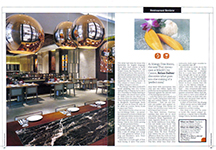Restaurant Review - Mango Tree |
 |
<<Click to see original |
Brian Salter discovers a new Thai restaurant in Mirdif and as a result finds himself coming to terms with the inadequacies of the English language…
I’ve never had time for those who bastardise the English language: those who don’t appear to know the difference between ‘less’ and ‘fewer’; those who insist on splitting their infinitives; those, like Napoleon in Orwell’s Animal Farm, who would insist that all animals were equal, but that some animals were more equal than others; and those who don’t appreciate that a thing cannot be very unique or nearly unique - it is either unique or it is not.
The Mango Tree Bistro in Mirdif’s brand spanking new City Centre opened only in March, but to see it on a Thursday or Friday heaving at the seams, you would never guess it. With room for 160 diners, it is the latest from the stable of Mango Trees that first surfaced in the ‘80s in Bangkok’s Surawongse Road, and can now be found in cities as far afield as London, Seoul, Kuala Lumpur and Tokyo.
But Dubai is lucky; it has not one, but two Mango Trees – an upmarket restaurant in Souk Al Bahar and now this new Bistro version in Mirdif. (And the word on the street is that there will soon be yet another Mango Tree in Abu Dhabi opening up, as well as one in Doha.)
My friend and I started with mocktails – Sushmita plumping for a Peach Smoothie whilst I had a Paradise Kiss, a mix of mango and orange juice with generous dollops of orange and blackberry jams. Sheer perfection in a glass.
And then to the appetisers – a bowl each of Tom Yum Goong, or spicy Thai prawn soup laced with lemongrass, lime juice and red chillies. Again, real perfection as the spiciness was well balanced against the delicate taste of the lemongrass and lime.
Larb Ped (spicy duck salad) and Yum Tua Plu (wing bean salad with egg and scallop) followed in quick succession – how can one compare one perfect dish against another? All Mango Tree dishes are equal, but perhaps some really are more equal than others?
The head waitress, Thitihime explains that there are no short cuts within this organisation. Only Thailand’s finest ingredients are used, regularly flown in to a special Dubai warehouse from Bangkok; and whilst some lesser Thai restaurants might make do with the likes of Chinese fish gravy as a substitute, they insist on using proper Nam Pla from Thailand. And, believe me, you can taste the difference. Even the chefs are from Thailand, adds restaurant manager John Victor, thus offering authentic Thai fare, rather than what other nationality chefs might consider to be a passable take off.
But it’s time to move on to the main course dishes. Sushmita loves the Panang Gai – chicken fillet in a curry sauce with kaffir lime, though she is not so enamoured by the Gai Thod Sukhothai – deep fried chicken with lemongrass and garlic which by its very nature is much crispier than the curry, or the Salmon Grapow – salmon fried with chilli and fresh basil – that, compared with some of the other more spicy dishes now appears somewhat bland. And yet if you were to have eaten either of these two dishes on their own, you would have declared them also to be cooked to perfection.
A plate of Kow Niew Ma Muang – fresh mango served with sweet sticky-rice with coconut milk – makes the perfect ending to a truly perfect meal.
How to compare one perfect dish against another? Can one be slightly more perfect than another? Or is it a case of first, second and third amongst equals?
One thing is for sure. In order to tackle this nearly unique conundrum, a repeat visit to Mirdif’s Mango Tree is, we think, essential.
What we liked: the perfect food, the attentive waiters, the varied menu, the modern and spacious décor.
What we didn’t like: the inadequacy of the English language to describe the relative perfection of what we had to eat.
Cost: about AED250 for a very generous and fulfilling meal for two people
